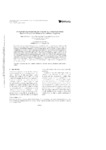Perceptual Generalization and Context in a Network MemoryInspired Long-Term Memory for Artificial Cognition

View/
Use this link to cite
http://hdl.handle.net/2183/24001Collections
- Investigación (EPEF) [590]
Metadata
Show full item recordTitle
Perceptual Generalization and Context in a Network MemoryInspired Long-Term Memory for Artificial CognitionDate
2019Citation
DURO, Richard J., et al. Perceptual Generalization and Context in a Network Memory Inspired Long-Term Memory for Artificial Cognition. International journal of neural systems, 2019, vol. 29, no 6, p. 1850053-1850053.
Abstract
Abstract: In the framework of open-ended learning cognitive architectures for robots, this paper deals with thedesign of a Long-Term Memory (LTM) structure that can accommodate the progressive acquisition ofexperience-based decision capabilities, or what different authors call “automation” of what is learnt, asa complementary system to more common prospective functions. The LTM proposed here provides fora relational storage of knowledge nuggets given the form of artificial neural networks (ANNs) that isrepresentative of the contexts in which they are relevant in a configural associative structure. It alsoaddresses the problem of continuous perceptual spaces and the task- and context-related generalizationor categorization of perceptions in an autonomous manner within the embodied sensorimotor apparatusof the robot. These issues are analyzed and a solution is proposed through the introduction of two newtypes of knowledge nuggets: P-nodes representing perceptual classes and C-nodes representing contexts.The approach is studied and its performance evaluated through its implementation and application to areal robotic experiment
Keywords
Memoria
Redes neuronales (Informática)
Robótica
Redes neuronales (Informática)
Robótica
Editor version
ISSN
1793-6462





